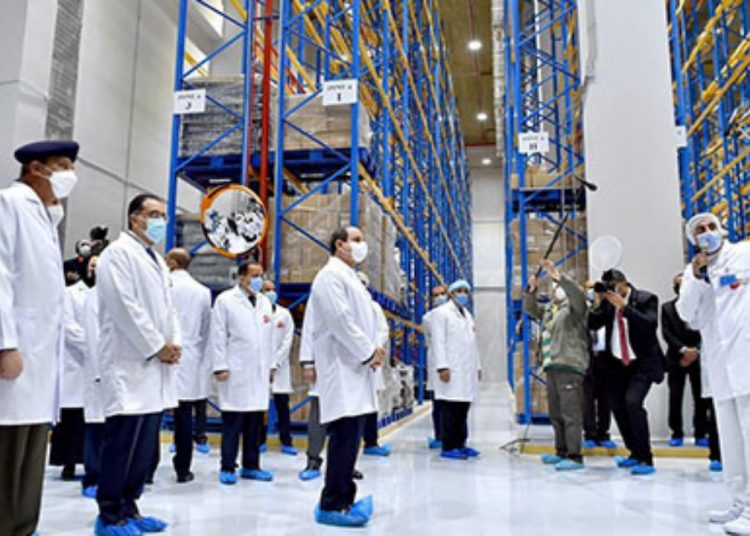The development of the health sector is among the priorities of the state. This has been evident in the increase of government spending on health to LE222 billion in fiscal budget 2022-2023, compared to LE32 billion in 2014. The Ministry of Health has devised a comprehensive strategy to develop the health system, which rests on three axes — infrastructure development, development of health services and investment in the human resources.
Presidential initiatives
The state has worked hard to establish new hospitals and medical centres nationwide, in addition to renovating and refurbishing existing ones and localising the pharmaceutical industry.
The presidential initiatives that focus on healthcare have achieved unprecedented success, benefiting over 90 million citizens.
Dr Hassan Tawfik, former chairman of the Health Insurance Authority, said the achievements resulting from medical initiatives are a source of pride for all Egyptians, especially the 100 Million Healthy Lives Initiative and those related to the coronavirus pandemic.
“Egypt has made improvements in the healthcare sector in recent years,” Tawfik told The Egyptian Mail.
The state seeks to apply the Universal Healthcare Insurance System (UHIS) to cover all Egyptians.
Several health initiatives have been launched since President Abdel Fattah El Sisi took office in June 2014 to provide free medical services across the country, Tawfik added.
Among the initiatives are the elimination of hepatitis C, early detection of non-communicable diseases, maternal health care, early detection of genetic diseases in newborns, early detection and treatment of hearing impairment for children, early examination of anemia, and obesity for school students, follow-up of women’s health and treatment of chronic diseases, early detection of kidney disease, and ending waiting surgery lists. The government offers comprehensive health care by improving medical services in all state-run hospitals and medical facilities.

100 Million Healthy Lives
The 100 Million Healthy Lives Initiative made Egypt free of hepatitis C, earning recognition and praise from the World Health Organisation (WHO). More than 80 million people in the 18-60 age group were screened and treatment was provided free for 2.2 million people. The initiative has brought down the cost of treatment, from LE64 and 150,000 people are now protected from virus C infection.

Comprehensive health insurance system
Minister of Finance and Chairman of the General Authority for Comprehensive Health Insurance, Mohamed Maeet said in recent statements that Egypt is proceeding with a strong political will to achieve the dream of all Egyptians of full health insurance, which is a major tool for reforming the health sector.
The minister referred to an increase by 10 per cent in government spending on health during the first nine months of the current fiscal year, compared to the same period last year.
Maeet said that the government’s target is to raise spending by a further 15 per cent from the 2023-2024 budget. In January 2021, President Abdel Fattah El Sisi directed the government to complete Egypt’s Universal Health Insurance System (UHIS) nationwide in 10 years instead of the scheduled 15 years.
The six-phase healthcare scheme, which started in Port Said governorate in early 2018, will cover the entire country by 2027.
Nationwide health infrastructure for the first phase of UHIS cost LE34 billion and total expenditure on phase one is LE53 billion, according to Ahmed Al-Sobky, Public Healthcare Authority for Health Care. The first phase of the system encompasses 350 facilities including medical complexes, hospitals, centres and family medicine units, Al-Sobky said.
‘One Health’ Approach
Through its health, scientific and academic institutions, the state has made much progress in recent years to implement the One Health Approach, in co-operation with international health organisations.
The government recently launched the One Health National Strategic Framework 2023-2027 as a joint roadmap for One Health between the Ministries of Health, Agriculture and Environment, in co-operation with the World Health Organisation (WHO) in Egypt and the United Nations Food and Agriculture Organisation (FAO).
The Ministries of Higher Education and Scientific Research and Local Development were involved in preparing the document, in addition to the Egyptian Drug Authority and the National Food Safety Authority.
Minister of Health Khaled Abdel Ghaffar said during the COP27 conference in Sharm el-Sheikh last November that activating One Health Approach became a matter of urgency, especially in the wake of the Covid-19 pandemic and the spread of unfamiliar epidemics.
Naima el-Qaseer, WHO representative in Egypt office, said: “One Health Approach is concerned about prevention and handling health emergencies, hence its inclusion as a principle in the International Convention on Pandemic Prevention, Preparedness and Response, drafted by WHO members”.

100 Healthy Days campaign
The 100 Healthy Days check-up campaign has delivered more than 7 million services nationwide since its launch on 25 June, 2023, Spokesperson for the Ministry of Health and Population Hossam Abdel-Ghaffar said recently.
The campaign, launched in accordance with directives from President Abdel Fattah El Sisi, aims to provide Egypt’s roughly 105 million population with services free of charge. Services include early detection and treatment of chronic illnesses, treatment of liver cancer for hepatic cirrhosis patients to eradicate Hepatitis C and treatment of nutrition among schoolchildren and children suffering from muscle atrophy.
The services delivered by medical convoys include family planning clinics, vaccinations and awareness campaigns. The pre-marriage medical examination initiative and the initiative to provide healthcare to the elderly will also benefit from the campaign.
Egyptian medicine city (Gypto Pharma)
The Medicine City is one of the most important national projects that the state sought to implement in order to possess the modern technological and industrial capacity in this field while preventing monopolistic practices and controlling drug prices.
On an area of 180,000 square metres, Medicine City is one of the largest of its kind in the Middle East. It is equipped with the latest technologies and global systems in drug production to become a regional hub that attracts major international companies in the pharmaceutical and vaccine industries.




